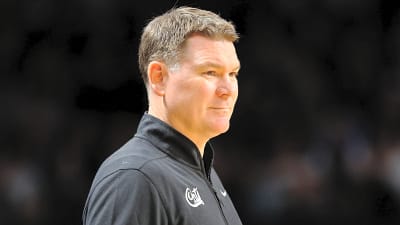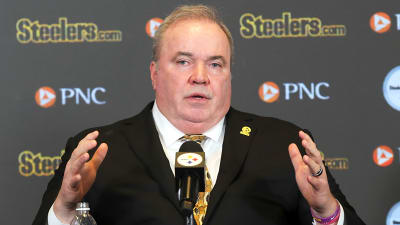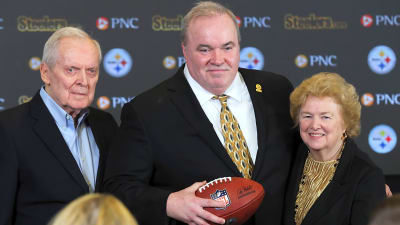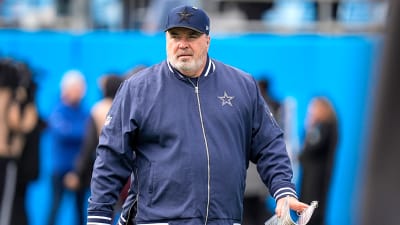- Home
- Quizzes
- My Quiz Activity
- Newsletters
- MY FAVORITES
- Add Sports/Teams
- SPORTS
-
NFL
- NFL Home
- Arizona Cardinals
- Atlanta Falcons
- Baltimore Ravens
- Buffalo Bills
- Carolina Panthers
- Chicago Bears
- Cincinnati Bengals
- Cleveland Browns
- Dallas Cowboys
- Denver Broncos
- Detroit Lions
- Green Bay Packers
- Houston Texans
- Indianapolis Colts
- Jacksonville Jaguars
- Kansas City Chiefs
- Las Vegas Raiders
- Los Angeles Chargers
- Los Angeles Rams
- Miami Dolphins
- Minnesota Vikings
- New England Patriots
- New Orleans Saints
- New York Jets
- New York Giants
- Philadelphia Eagles
- Pittsburgh Steelers
- San Francisco 49ers
- Seattle Seahawks
- Tampa Bay Buccaneers
- Tennessee Titans
- Washington Commanders
-
MLB
- MLB Home
- Athletics
- Arizona Diamondbacks
- Atlanta Braves
- Baltimore Orioles
- Boston Red Sox
- Chicago White Sox
- Chicago Cubs
- Cincinnati Reds
- Cleveland Guardians
- Colorado Rockies
- Detroit Tigers
- Houston Astros
- Kansas City Royals
- Los Angeles Angels
- Los Angeles Dodgers
- Miami Marlins
- Milwaukee Brewers
- Minnesota Twins
- New York Yankees
- New York Mets
- Philadelphia Phillies
- Pittsburgh Pirates
- San Diego Padres
- San Francisco Giants
- Seattle Mariners
- St. Louis Cardinals
- Tampa Bay Rays
- Texas Rangers
- Toronto Blue Jays
- Washington Nationals
-
NBA
- NBA Home
- Atlanta Hawks
- Boston Celtics
- Brooklyn Nets
- Charlotte Hornets
- Chicago Bulls
- Cleveland Cavaliers
- Dallas Mavericks
- Denver Nuggets
- Detroit Pistons
- Golden State Warriors
- Houston Rockets
- Indiana Pacers
- Los Angeles Clippers
- Los Angeles Lakers
- Memphis Grizzlies
- Miami Heat
- Milwaukee Bucks
- Minnesota Timberwolves
- New Orleans Pelicans
- New York Knicks
- Oklahoma City Thunder
- Orlando Magic
- Philadelphia 76ers
- Phoenix Suns
- Portland Trail Blazers
- Sacramento Kings
- San Antonio Spurs
- Toronto Raptors
- Utah Jazz
- Washington Wizards
-
NHL
- NHL Home
- Anaheim Ducks
- Boston Bruins
- Buffalo Sabres
- Calgary Flames
- Carolina Hurricanes
- Chicago Blackhawks
- Colorado Avalanche
- Columbus Blue Jackets
- Dallas Stars
- Detroit Red Wings
- Edmonton Oilers
- Florida Panthers
- Los Angeles Kings
- Minnesota Wild
- Montreal Canadiens
- Nashville Predators
- New Jersey Devils
- New York Islanders
- New York Rangers
- Ottawa Senators
- Philadelphia Flyers
- Pittsburgh Penguins
- San Jose Sharks
- Seattle Kraken
- St. Louis Blues
- Tampa Bay Lightning
- Toronto Maple Leafs
- Utah Mammoth
- Vancouver Canucks
- Vegas Golden Knights
- Washington Capitals
- Winnipeg Jets
- NCAAF
- NCAAM
- Olympics
- Boxing
- Entertainment
- Lifestyle
- Golf
- MMA
- Soccer
- Tennis
- Wrestling
- Sports Betting
- More Sports
- RESOURCES
- My Account
- YB on Facebook
- YB on Twitter
- YB on Flipboard
- Contact Us
- Privacy Policy
- Terms of Service
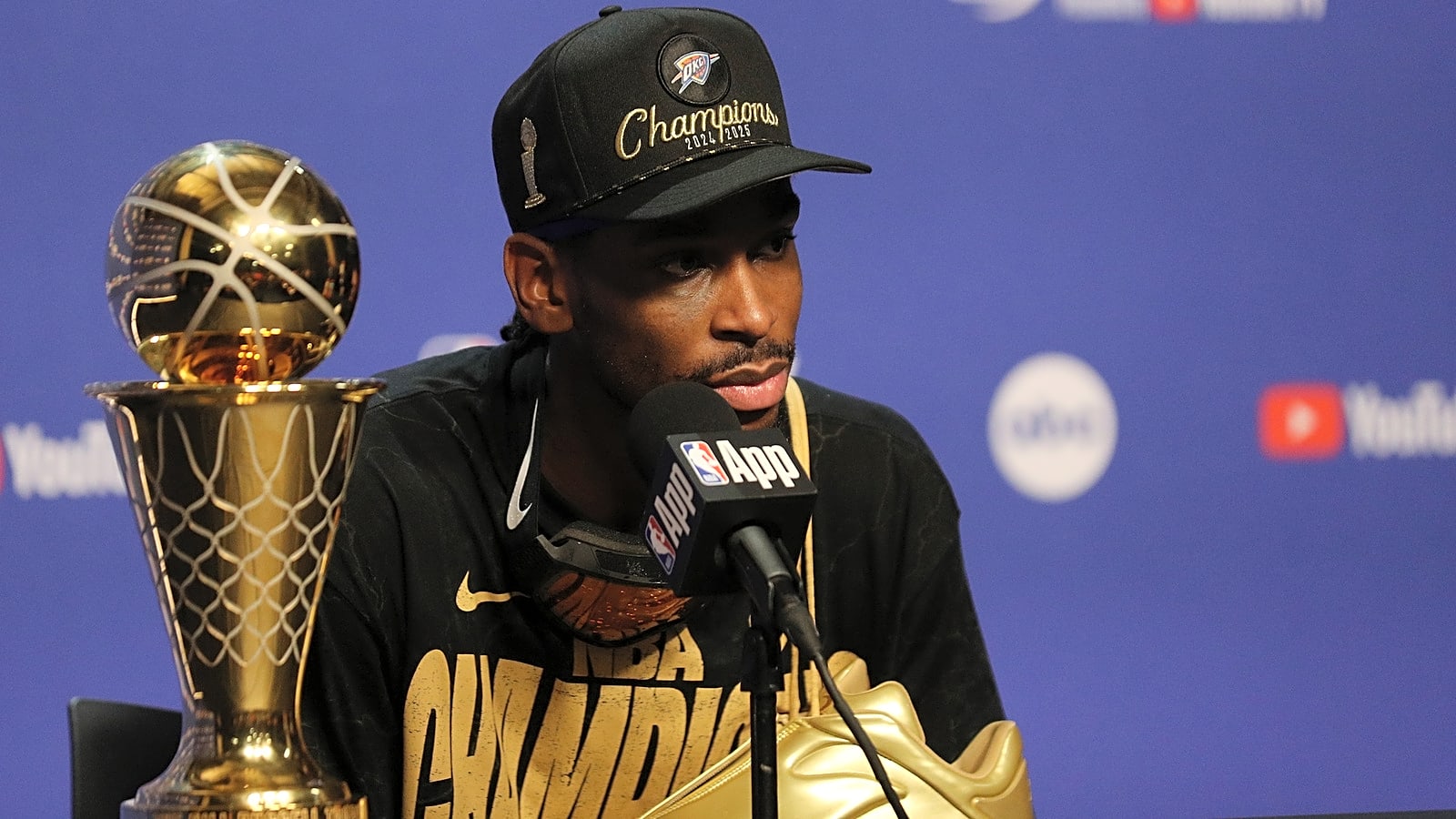
Would it be nice if the NBA, like the NHL, had a postseason MVP, as opposed to just a Finals MVP? Sure, but MLB has a World Series MVP, and even the NFL only does a Super Bowl MVP, and that’s just one game. The NBA first handed out Finals MVP in 1969. Here is every winner of the NBA Finals MVP, a who’s who of Association history.
1969: Jerry West
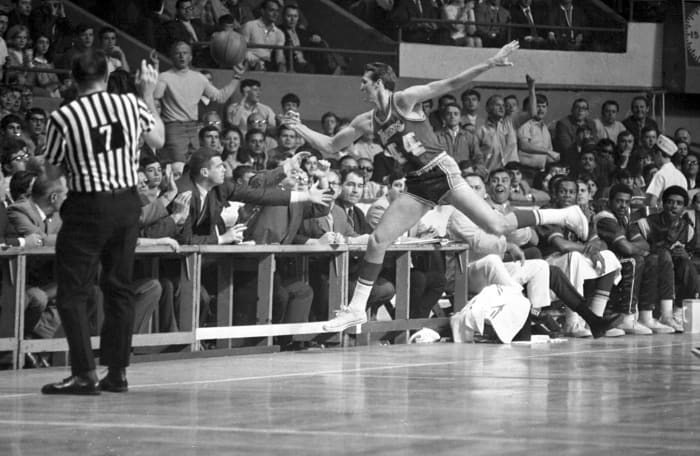
West’s win is historical in two ways. One, obviously, he’s the first-ever winner of Finals MVP. Two, West’s Lakers lost in seven games to the Celtics. To date, “The Logo” is the only player to win Finals MVP while playing for a losing team. Feels like it may never happen again.
1970: Willis Reed

This win speaks to the fact that vibes-based voting goes back a long time. The Knicks beat the Lakers in seven games, and voters did not want to give a player on the losing team the award once again. Reed led the Knicks with 23.0 points per game. He also injured his thigh in Game 5 and missed Game 6. Then, you know what happened. Reed wasn’t expected to play in Game 7. Then, he came out during warm-ups, the MSG crowd erupted, and the storytellers will insist that Wilt Chamberlain was so shook the game was over before it started. Reed also only scored two baskets and didn’t play in the second half. And yet, he was the Finals MVP.
1971: Kareem Abdul-Jabbar
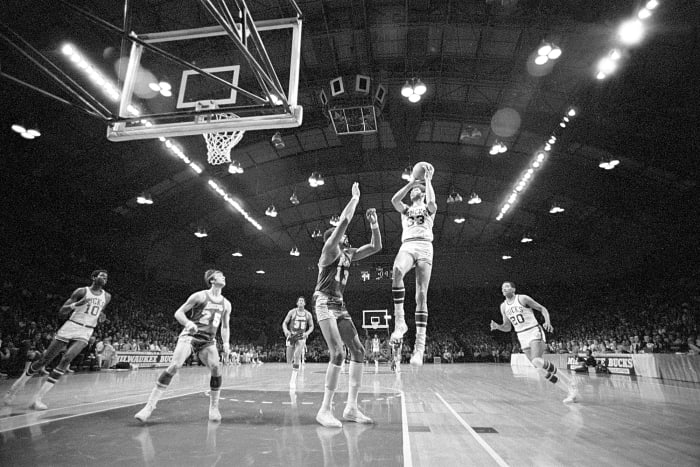
There was no chance a player from the losing team was going to win Finals MVP this year, given that the Bucks swept the Bullets. Now, at the time, Abdul-Jabbar wasn’t just a Buck, but he was still known as Lew Alcindor. This was actually his last season before his name change. The Bucks truly rolled the Bullets. This may have been the least competitive NBA Finals in history. Alcindor was an easy choice for Finals MVP, though, shout out to Oscar Robertson.
1972: Wilt Chamberlain

Chamberlain gets a lot of criticism – too much criticism – because Bill Russell had more rings. “Wilt the Stilt” was an all-time force, though, he did win titles, and he did win Finals MVP in 1972. In fact, he did it while facing the Knicks of Willis Reed Game fame. Though Gail Goodrich led the Lakers in points, Chamberlain averaged 19.4 points and a whopping 23.2 rebounds per game. Also, this was before blocks were an official stat, but obviously, he had some of those.
1973: Willis Reed
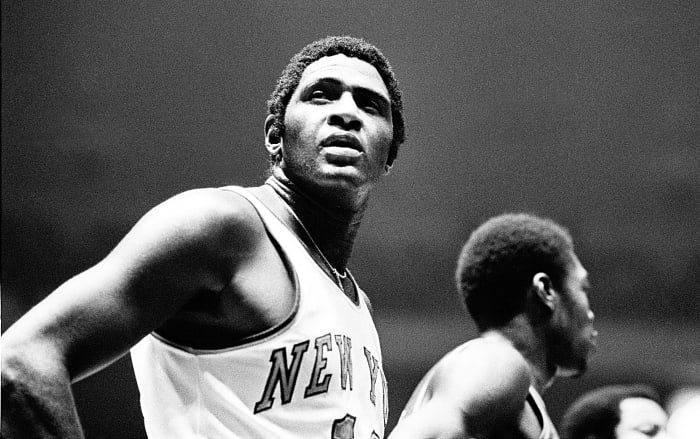
So, the thing about the 1972 Finals is that Reed was out with a knee injury. The Lakers and Knicks met in the NBA Finals again in 1973, and this time Reed was healthy. He also became the first multiple winner of Finals MVP. The Knicks spread the wealth offensively en route to winning the series in five games. Reed’s 16.4 points and 9.2 rebounds per contest were strong. However, Chamberlain managed a mere 11.6 points per game, and Reed got deserved credit for shaking the superstar once again.
1974: John Havlicek

No, this was not the occasion on which Havlicek famously stole the ball. That occurred in the 1968 Eastern Conference Finals. Like that series, though, this one went seven games, as Kareem and the Bucks gave the Celtics everything they had. Also, yes, back in the day the Milwaukee Bucks were in the Western Conference. Havlicek had suffered a shoulder injury the season prior, kneecapping a 68-win Celtics team. His return to health and his availability in 1974 was a difference maker.
1975: Rick Barry

The Golden State Warriors didn’t have to wait around for Steph Curry to achieve greatness. Golden State won a title in 1975 behind Hall of Famer Rick Barry. While he’s mostly remembered now for his underhanded free-throw shooting, Barry was a world-class bucket getter, and he led the Warriors in points in all four games of this sweep.
1976: Jo Jo White

White is not one of the venerated names in Celtics lore, but winning Finals MVP in 1976 probably tipped the scales in getting him in the Hall of Fame. He was very good with the Celtics, but he topped out at second-team All-NBA twice. White was a two-time All-American at Kansas, though, and won a gold medal in 1968. He likely would have been a “no” in terms of the Hall, but this Finals MVP made him a borderline case. Eventually he got in, but to speak to the iffiness of his case, White retired in 1981 and got inducted in 2015.
1977: Bill Walton

We all know the “What could have been?” of Walton’s career. An excellent player at UCLA, back issues hampered Walton’s NBA career. In his flashes of health, though, Walton was a remarkable NBA player. His peak came over the 1976-1978 span, though he missed plenty of games in that time. In 1977, Walton was Finals MVP in leading the Trail Blazers to the franchise’s only title. The next season, he won MVP during the regular season, but that would prove to be the peak for this immensely talented big man.
1978: Wes Unseld

What an old-school finals this was. We had the Washington Bullets beating the Seattle SuperSonics in seven games. This was also an unusual finals in another way. The Bullets were third in the East, and the Sonics fourth in the West. Neither team won 50 games, the only time that has happened since 1958, back when the league played decidedly fewer games. Unseld’s selection as Finals MVP is confusing. He averaged 9.0 points per game, and while he also brought down 11.7 boards per game, Elvin Hayes had 11.9 rebounds per contest while also scoring 20.7 points per game to lead the Bullets. Oh, and Hayes had 2.0 blocks and 1.6 steals per contest as well, so the fact he wasn’t Finals MVP is truly odd.
1979: Dennis Johnson

Believe it or not, the Sonics and Bullets met in the next NBA Finals as well. This time things weren’t nearly as competitive, as Seattle won the title in five games (a title the city holds in our book and did not pass on to the Thunder). Johnson is best-remembered for his time with the Celtics, because he won two rings and, well, they are the Celtics. He began his career as a star with the Sonics, though, and his all-around game was key for the team. Johnson didn’t lead the team in points, or assists, but he averaged 22.6 points per game and 4.0 steals-plus-blocks, and he did that as a point guard. Johnson was a deserved Hall of Fame inductee in 2010, but sadly he had surprisingly passed away in 2007, collapsing of a heart attack while coaching the Austin Toros.
1980: Magic Johnson

During the regular season, Johnson’s teammate Kareem was MVP. His rival Larry Bird won Rookie of the Year. Magic made his splash, though, by winning Finals MVP in returning the Lakers to glory. His performance in the series-clinching Game 6 was one of the best individual performances in NBA Finals history. Magic had 42 points, 15 rebounds, and seven assists. Oh, and he played all five positions and started the game at center even though he was a point guard.
1981: Cedric Maxwell

Maxwell made unexpected history in 1981, history that nobody could be aware of at the time. He had a strong series, averaging 17.7 points per game to lead the Celtics, and he also added 9.5 rebounds per contest. What’s the history then? Maxwell was a fine player, but, to date, he is the only Finals MVP who is not in the Hall of Fame who is eligible for the Hall of Fame. All of the not-eligible guys, save for one, are either surefire Hall of Famers or too early in their careers to decide. If you needed further proof that basketball is a star-driven sport, here it is.
1982: Magic Johnson

It was pretty clear pretty early Magic wouldn’t be a Maxwell and was on a Hall of Fame path. After all, he won Finals MVP twice in his first three seasons. The Lakers spread the wealth scoring-wise, but in addition to his assists (and steals), once again, Johnson, a point guard, led the team in rebounds. Yes, he outrebounded Kareem.
1983: Moses Malone

Malone, who famously broke the precedent by entering the NBA right out of high school, was determined to ensure his legacy was secured by a title. Julius Irving was still a good player, but Dr. J took a backseat to Malone. In addition to averaging 25.8 points per game, one of the NBA’s elite rebounders historically refused to let the Lakers grab any boards. Malone averaged 18.0 rebounds per game, and nobody on the Lakers averaged more than 7.8. The 76ers cruised to a sweep.
1984: Larry Bird

Bird had already been a really good NBA player, but 1983-84 was the season he emerged. He won both MVP and Finals MVP for the first time. We say the first time, because neither win was his last on either front. When people talk about the Lakers and Celtics, and Magic and Bird, revitalizing the NBA, this is a crucial turning point. Boston and Los Angeles met in the Finals, and the series went seven games. While the aforementioned Maxwell and Johnson stepped up for the Celtics in Game 7, Bird was the best player over the series. He averaged a whopping 27.4 points per game, in an NBA Finals mind you, not to mention 14.0 rebounds.
1985: Kareem Abdul-Jabbar

This time, the Lakers got one over on the Celtics. What remarkable durability Kareem had as a player. He averaged 31.7 points per game to win Finals MVP. In 1985. Don’t forget, Kareem won his first Finals MVP all the way back in 1971. Yes, that is the largest gap between wins in the history of the award.
1986: Larry Bird

For a three-season span, Bird was the best player in the world. Don’t take our word for it. Bird won MVP in 1984, 1985, and 1986. The Celtics won two titles in that time, and Bird was Finals MVP both times. This was the end of an era, though. Boston would not win another title for decades, and Bird would never win another major award. Ho hum. He had to settle for three MVPs and two Finals MVPs.
1987: Magic Johnson

Magic one-upped Bird here. One again, the Lakers and Celtics met in the NBA Finals. Bird averaged 24-and-10 and would have been Finals MVP had the Celtics won the title. They didn’t, of course. The Lakers did, in six games for the record, and Johnson was the star of the show. He averaged 26.2 points, 8.0 rebounds, 13.0 assists, and 2.3 steals per game to become the first three-time Finals MVP.
1988: James Worthy
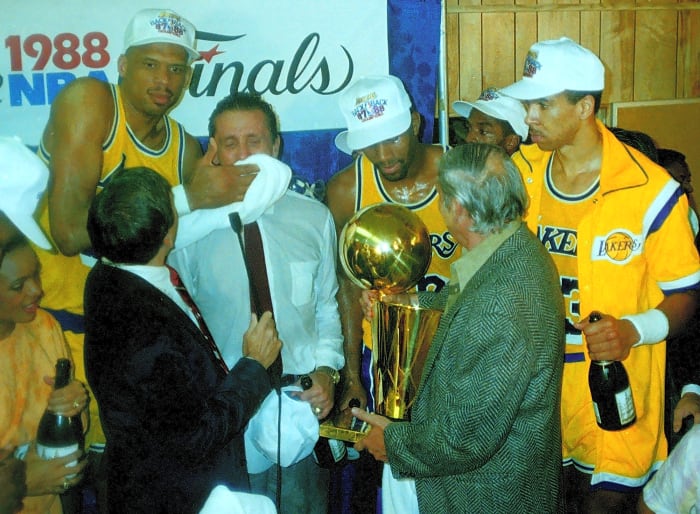
Worthy, like White, probably owes his spot in the Hall of Fame to his success in an NBA Finals. Well, and college success. Worthy was named the Final Four Most Outstanding Player in leading North Carolina to a title. Then, as the Lakers won the third title with Worthy on the roster, he was Finals MVP. The two finishes on third-team All-NBA weren’t going to get Worthy in the Hall. They called him “Big Game James,” though, and his college and NBA awards helped bolster that reputation.
1989: Joe Dumars

The era of the Celtics and Lakers came to an end in 1989. While Los Angeles did make it to the NBA Finals, the Pistons swept them, and neither Boston nor Los Angeles would win a title for some time. Dumars, a fine player and a worthy Hall of Famer who didn’t need a Finals MVP to make that happen, was the second banana on the Bad Boy Pistons. However, odd things can happen in a sweep. To that end, Dumars averaged 27.3 points per game, which was unexpected, but it did happen.
1990: Isiah Thomas

When the Pistons repeated, the star of the show did get his Finals MVP. Dumars was no slouch against the Trail Blazers, but Thomas was the force to be reckoned with over five games. The Pistons’ star point guard averaged 27.6 points and 7.0 assists per game to lead the team on both fronts.
1991: Michael Jordan
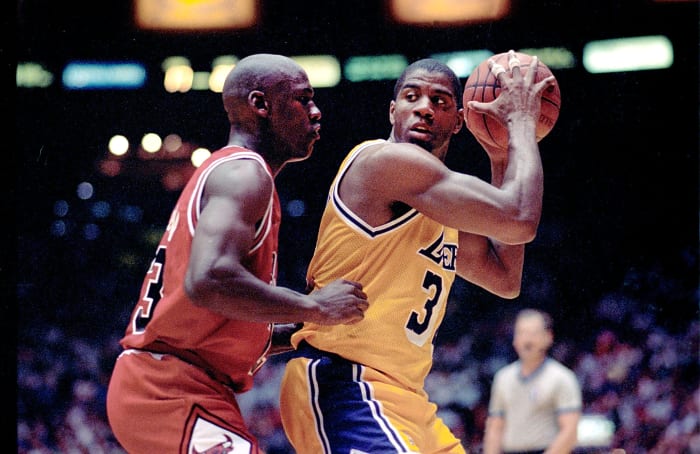
The Pistons got their titles in while they could. Jordan and the Bulls took the NBA over starting with the 1990-91 season. The torch sort of got passed here, as Jordan’s first NBA Finals was Magic Johnson’s last. Jordan had already emerged as the NBA’s best player, but he showed just how good he was on the NBA’s biggest platform. MJ averaged a whopping 31.2 points per game, not to mention 11.4 assists per game. Jordan wasn’t known for his passing, so that is truly impressive.
1992: Michael Jordan

Both the Bulls and Jordan repeated in 1992. Facing the Trail Blazers, in Game 1 Jordan had 35 points…in the first half. In the clinching Game 6, the Blazers did actually hold Jordan scoreless for almost the entire first quarter. Of course, that wasn’t going to be sustained. In the end, Jordan dropped 33 points in that game and the Bulls were champs.
1993: Michael Jordan

Jordan joined Magic as a three-time Finals MVP. The difference, of course, is that Jordan did it three times in a row. Jordan solidified himself as an all-timer by leading the Bulls to being the first team to win three in a row since the Celtics in the 1960s, back when there were, like, four viable NBA teams. Perhaps being irked by being snubbed for MVP in 1993, Jordan went out and averaged 41.0 points over six games against the Suns. Yes, Jordan averaged over 40 points per game in the NBA Finals.
1994: Hakeem Olajuwon
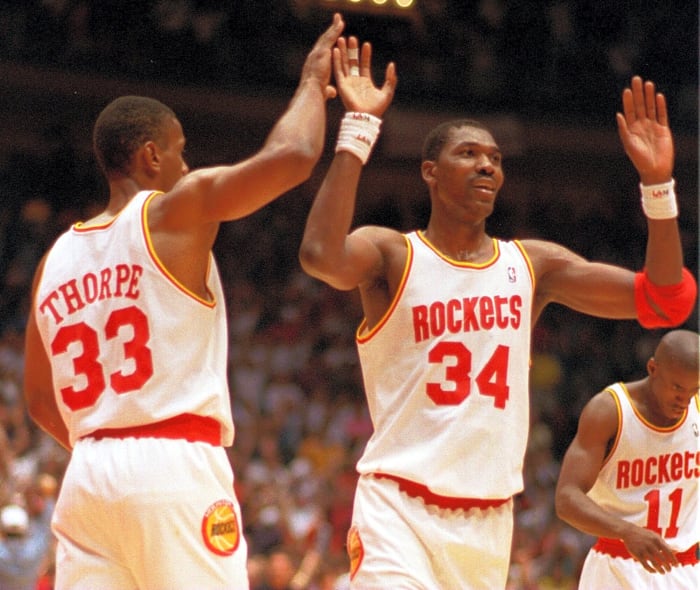
Jordan’s baseball sojourn opened the door for another team to win the title, and for another player to be Finals MVP. Olajuwon fully stepped in as the NBA’s best player in MJ’s wake. He won both MVP and Defensive Player of the Year in the regular season. Then, he led the Rockets to a title and won Finals MVP. No MJ or not, that’s an incredible campaign from Olajuwon.
1995: Hakeem Olajuwon
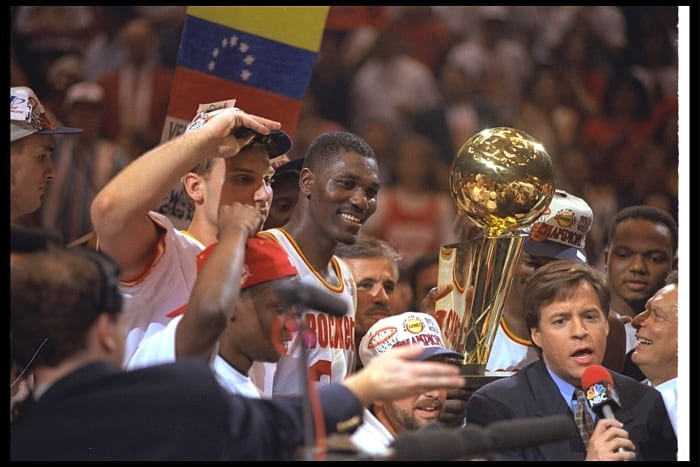
The thought was that 1995 would be the coronation of Shaq. Orlando was the best team in the Eastern Conference (Jordan returned to the Bulls, but late in the season, and they never got up and running). The Magic, and Shaq, seemed to luck out in getting the Rockets in the finals. Houston was the sixth seed in the West. However, while Shaq was great, Olajuwon was just as good. Hakeem had over 30 points in every game of the series, and the series was only four games at that. The Rockets swept the Magic, and Shaq had to wait for his coronation. Also, move cities.
1996: Michael Jordan

Jordan wasn’t going to let the Bulls fall short when he had a full offseason to get ready and a full season to play. He became the first four-time Finals MVP winner. After memorably leading Chicago to a 72-10 record, Jordan and the Bulls made it back to the finals. Credit where it is due, the Sonics, led by Gary Payton, didn’t make things easy for Jordan. He “only” averaged 27.3 points per game, though that was still tops in the NBA Finals.
1997: Michael Jordan

Jordan is the only five-time winner of NBA Finals MVP. The Bulls met the Jazz in the NBA Finals, and the Jazz featured MVP Karl Malone. As with when the Bulls met Charles Barkley and the Suns, the psychotically competitive Jordan was geared up to best Malone and let everybody know what the score really was. He averaged 32.3 points, seven rebounds, and six assists per game, and the Bulls won the title in six. Jordan 1, Malone 0.
1998: Michael Jordan

Jordan 2, Malone 0. Also, Jordan 6, everybody else (at the time) 3 or fewer. Jordan is the only six-time Finals MVP, and is going to be the only-ever six-time Finals MVP. We’re confident in saying that. Well, odds are you watched “Last Dance,” so we probably don’t need to say anything else about this one, right? We’ll just note this was the end of an era for the Bulls, and for Jordan. There will likely never be another NBA run like this.
1999: Tim Duncan

The Duncan coronation worked out better than the Shaq coronation. Owing in part to the 1998-99 season being shortened by a lockout, we saw an eighth-seeded Knicks team make the NBA Finals. Their opponent was the surging Spurs, who had lucked into winning the lottery when Duncan was the clear top pick. There would be no Rockets-style upset this time. San Antonio won in five games and Duncan was Finals MVP with 27.4 points and 14.0 rebounds per game, both of which led the Spurs.
2000: Shaquille O’Neal

Shaq got his ring, and he got his Finals MVP. He just did it with the Lakers, not the Magic. While Kobe Bryant was on this time, he wasn’t quite the superstar he’d become. Case in point, Bryant averaged 15.6 points per game in this series. Shaq, meanwhile, beat up the Pacers. He averaged a robust 38.0 points, 16.7 rebounds, and 2.7 blocks per game. A motivated, in-his-prime Shaq was a once-in-a-generation force.
2001: Shaquille O’Neal
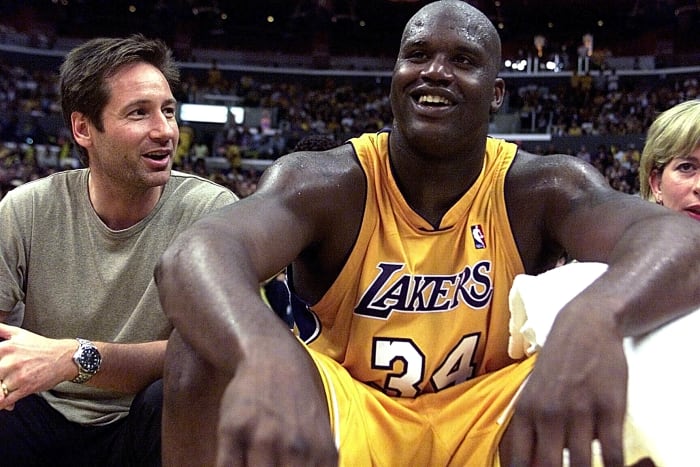
This was the season the Lakers went half speed during the regular season and then kicked it into high gear for the playoffs. Shaq is the avatar for that. The Lakers famously went 15-1 this postseason, with the only loss coming in overtime in Game 1 of the finals. While O’Neal didn’t have the reputation for always being fully engaged and giving it his all, in the finals he was motivated and averaged over 30 points and three blocks per game.
2002: Shaquille O’Neal

Shaq became the second, and most recent, player to win NBA Finals MVP three seasons in a row. It’s hard, because your team has to essentially win three titles in a row, and you have to be considered the best player every time. MJ did it, and then Shaq did it. In a sweep of the Nets, O’Neal poured in the points. He averaged a whopping 36.3 points per game.
2003: Tim Duncan

The Nets returned in the 2003 NBA Finals, but this time to lose to the Spurs instead of the Lakers. This was peak Spurs, as David Robinson was still around and Manu Ginobili and Tony Parker had joined the team. Of course, it was Duncan who was the all-timer in his prime. Not only did he average over five blocks per game, Duncan led the Spurs in points, rebounds, and assists as well.
2004: Chauncey Billups

It’s the most anomalous title in history. The Pistons didn’t have any MVP candidates. They didn’t have any superstars. Two Hall of Famers were on the team, but without this ring, and this Finals MVP, Billups wouldn’t be there. Teams like this don’t win NBA titles, but the Pistons did. Billups and Rip Hamilton scored essentially the same number of points, but Billups led the team in assists and averaged 1.2 steals per game. Detroit’s point guard, the man nicknamed “Mr. Big Shot,” got the Finals MVP.
2005: Tim Duncan

The last two NBA champs met one another in the 2005 NBA Finals. San Antonio, the more-talented team, eked it out in seven games. Duncan had to deal with Ben Wallace, a four-time Defensive Player of the Year, so it’s not surprising he “only” averaged 20.6 points per game. However, Duncan was a defensive force himself, and 20 points per game in 2005 NBA basketball was quite good.
2006: Dwyane Wade

The 2006 Heat had two future Hall of Famers at the end of their careers (Alonzo Mourning and Gary Payton) and one who was just out of his prime (Shaq). However, another future Hall of Famer, Wade, was just entering his prime. He played a whopping 43.5 minutes per contest, and he averaged 34.7 points per game to pace Miami to the title.
2007: Tony Parker

LeBron James (who will appear again) made it to his first NBA Finals. Then, the Spurs rolled the Cavaliers. It was a sweep, and while Duncan was great as per usual, the four-game nature of the series allowed Parker to be slightly better over a short span. The French point guard led the Spurs in scoring, and topped the team in points in three of the four games in the series.
2008: Paul Pierce

The Celtics returned to the NBA Finals, and won another ring, largely owing to the return of Kevin Garnett and Ray Allen. However, it was the longtime Celtic in Pierce who was Finals MVP. Boston’s Big Three all scored well, but Pierce was tops at 21.8 points per game. He added 6.3 assists per game, which secured the award for Pierce.
2009: Kobe Bryant

When it was the Shaq-and-Kobe era, the postseason was Shaq’s time to shine. He’d get serious and at that point his size and strength would be paired with drive and stamina. That’s why Shaq was Finals MVP all three times they won titles together. When it was Kobe-and-Pau, though, it was Bryant’s time to shine. The Lakers took down the Magic in five games, with Kobe averaging 32.4 points and 7.4 assists per contest.
2010: Kobe Bryant

In a blast from the past, this was a classic Lakers-Celtics series. The two teams went to seven games once again. It was Kobe-and-Pau against the Big Three. Now, the Artist Sometimes Known as Ron Artest was the hero in Game 7, Kobe led the team in that game with 23 points, and he averaged 28.6 points and 2.1 steals per game over the series. This was the last hurrah for both these Lakers and these Celtics, because a new Big Three was brewing in Miami.
2011: Dirk Nowitzki

LeBron and Chris Bosh joined Wade on the Heat…and then Dirk and Dallas beat them in the NBA Finals. Nowitzki, arguably the best European player in history and a guy who legitimately changed the NBA, fortunately was able to get a ring to cap his career (even if he continued to play for years). Dirk comfortably paced the team with 26.0 points per game, and he ended up with 9.7 rebounds per contest as well.
2012: LeBron James
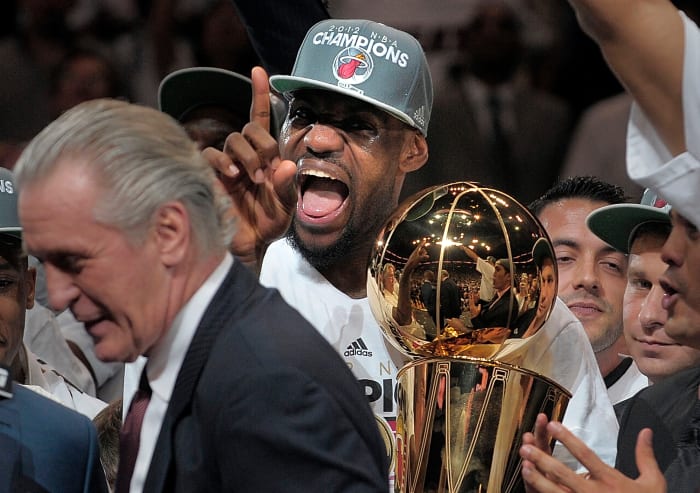
LeBron, Wade, and Bosh were going to win a ring eventually. They just needed a chance to get used to working together. In 2012 the Heat won the title comfortably over the Thunder, beating them in five games. LeBron, the best player of his generation, got his first ring, and his first Finals MVP as well. The best player since Jordan averaged a double-double with points and rebounds, but also added 7.4 assists per game. LeBron topped the Heat in all three categories.
2013: LeBron James

Back-to-back titles for the Heat, and back-to-back Finals MVPs for LeBron. This was not an easy title for the Heat. The Spurs pushed them to seven games, and of course, this is the series where Ray Allen made one of the most iconic shots in NBA history. Of course, one shot isn’t going to win anybody Finals MVP, or at least it shouldn’t. LeBron, once again, averaged a double-double, and in addition to also leading the Heat in assists, he led them in steals for good measure. This guy: Pretty good at basketball!
2014: Kawhi Leonard
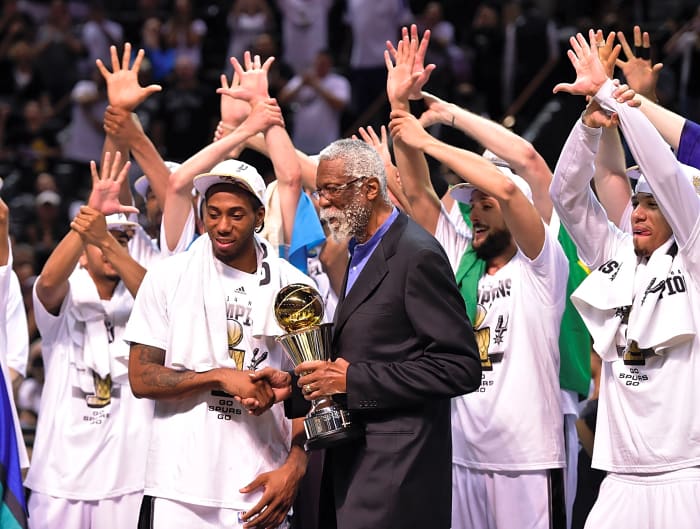
The Spurs and Heat matched up again in 2014, but this time the Spurs won in a walk. Duncan got one last title, but it was the young lockdown defender who emerged as Finals MVP. Kawhi will someday join three of his teammates, and his head coach, in the Hall of Fame. His 17.8 points per game was good, but it’s his elite defense that really carried the day.
2015: Andre Iguodala

Iguodala is the one guy who is likely to join Maxwell in not making the Hall of Fame. If he makes it, it will be because he played on four title-winning teams, and because he won this Finals MVP for the first of the Warriors four titles during the Steph Curry Era. Iguodala was a good player for these Warriors, but Curry led the offense, and Draymond Green led the defense. The thought that permeated was that Iguodala helped keep LeBron in check. You know, the LeBron who averaged 35.8 points per game in this series. In the end, Iguodala is definitely only a better player than Maxwell among Finals MVP winners, and it would be a mistake if he ends up in the Hall. Let this be his peak achievement.
2016: LeBron James
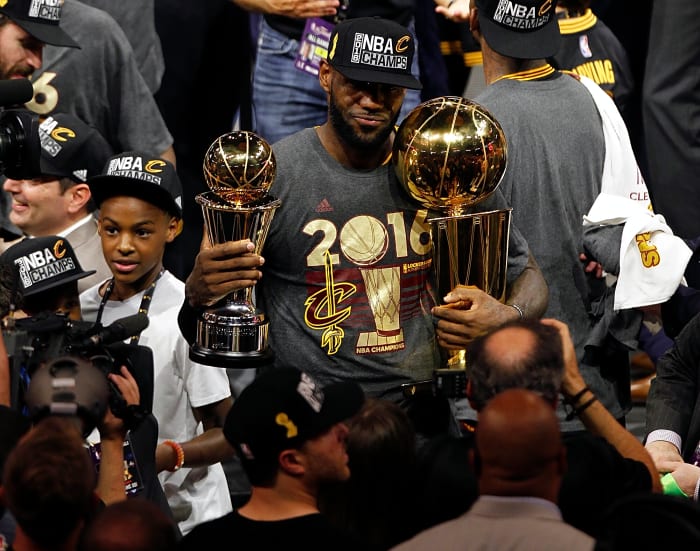
LeBron, back with his hometown Cavaliers, was not going to be denied. Taking his talents to South Beach had complicated matters with Cleveland, but winning this title helped smooth things over. LeBron and company memorably overcame a 3-1 series deficit to beat the Warriors in seven games. Even just looking at Game 7, LeBron’s impact was clear. He had 27 points, 11 assists, and the most famous block in NBA Finals history.
2017: Kevin Durant

That 2016 loss really stung the Warriors. Durant was desperate to win a ring. Golden State and KD joined forces, and that was that. The Warriors beat the Cavaliers in five games, and Durant earned his ring by winning Finals MVP. He averaged 35.2 points per game, better than even LeBron.
2018: Kevin Durant

What a boring NBA Finals. Not only were the Warriors and Cavaliers meeting for the fourth season in a row, the Warriors won in a sweep. LeBron was the best player in the series, but nobody was going to give the Finals MVP to a guy whose team got swept. Durant led the Warriors in points, rebounds, and blocks, and was second in assists. He won his second Finals MVP in as many seasons.
2019: Kawhi Leonard

Talk about taking care of business. Kawhi got himself out of San Antonio and headed to the Raptors. He led them to the NBA Finals for the first time in franchise history. Leonard averaged 29.5 points and 9.8 rebounds per game. He also averaged 3.5 steals-plus-blocks per contest as well. Leonard got the Raptors a ring, and then he headed out to the Clippers. One season, one title, one Finals MVP. Everybody won.
2020: LeBron James

Only two players have a viable claim to be the best NBA player: Jordan and LeBron. James’ career, by and large, has been better. If you are making the MJ case, it comes down to the fact he won six rings and six Finals MVPs. LeBron has four rings and four Finals MVPs. Of course, LeBron is the only other player with more than three. He won his fourth with the Lakers, doing so in the playoffs in “The Bubble.” Despite all the chaos, LeBron came up big as the Lakers bested his former team the Heat in six.
2021: Giannis Antetokounmpo

In 2020, Giannis became one of the rare players to win MVP and Defensive Player of the Year in the same season. That’s all well and good, but he probably enjoyed 2021 just as much. The Greek superstar led the Bucks to the franchise’s second championship, following in the footsteps of Kareem. Milwaukee beat Phoenix behind Giannis’ 35.2 points and 13.2 rebounds per game. Plus, that DPOY-level defense.
2022: Stephen Curry
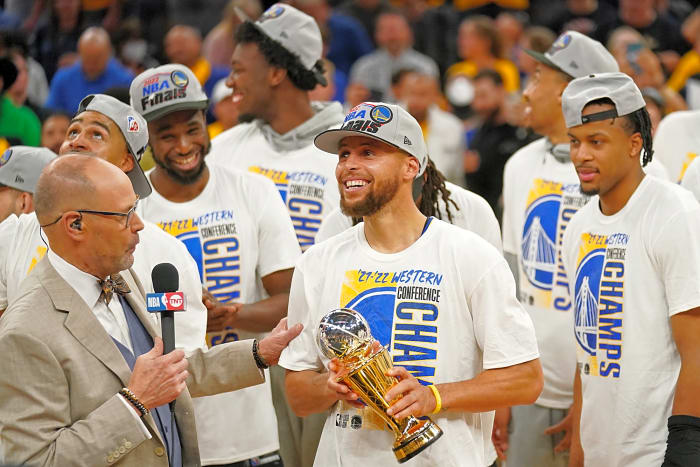
There was, legitimately, some handwringing about Curry possibly never winning a Finals MVP. Iguodala got one controversially, and then Johnny Come Lately Kevin Durant won two. Fortunately for Curry, and the handwringers, the Warriors got themselves another ring. This time around, Curry would have had to absolutely fall on his face not to be handed Finals MVP. Golden State beat Boston, and Curry decidedly did not fall short. He was the only player in the series to average over 25, let alone 30, points per game.
2023: Nikola Jokic
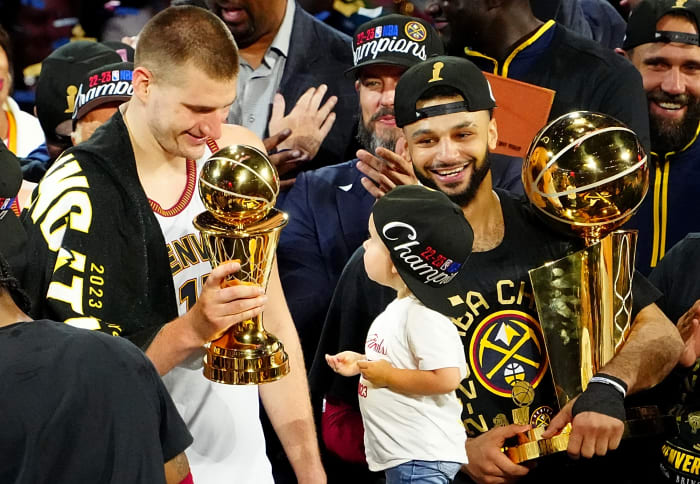
Jokic is pretty much locked in as the best draft pick in NBA history. You know the story. He was taken in the second round during a Taco Bell commercial. Jokic now stands as the best passing big man ever, and one of the best passers full stop. He has three MVPs, and he also led the Nuggets to their first-ever title. When that happened, he naturally won Finals MVP as well. Jokic dropped 7.2 dimes per game, but also had 30.2 points and 14.0 rebounds per contest over five games as well.
2024: Jaylen Brown
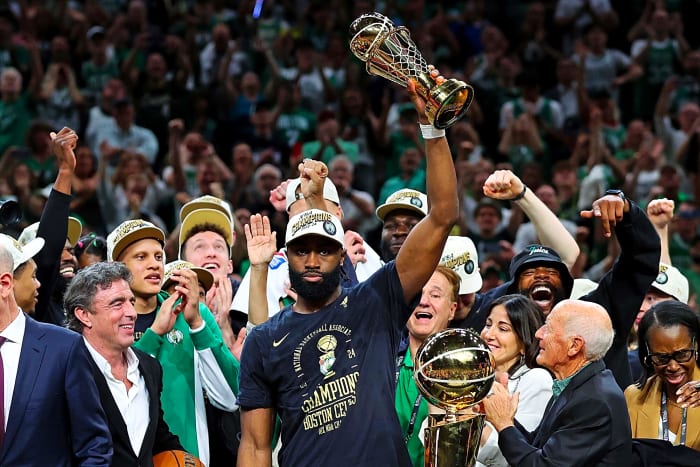
Brown, at present, isn’t necessarily on the Hall of Fame path, but his career has gotten off to a good start. He’s been to four All-Star Games and made second-team All-NBA once. Plus, Brown now has a Finals MVP as well. The Celtics beat the Mavericks in five games, and it was neck-and-neck between Brown and Jayson Tatum for Finals MVP. Tatum averaged slightly more points, rebounds, and assists, but Brown played better defense, so he eked it out.
2025: Shai Gilgeous-Alexander

Gilgeous-Alexander went from the guy who sweetened the Paul George deal to winning both MVP and Finals MVP in the same season. The Thunder won the franchise's first title (the Sonics' title belongs to Seattle now and forever in our books) behind SGA. Arguably the NBA's best bucket getter, Gilgeous-Alexander led the NBA in scoring in the regular season and then averaged 30.2 points per game in the playoffs.
Chris Morgan is a Detroit-based culture writer who has somehow managed to justify getting his BA in Film Studies. He has written about sports and entertainment across various internet platforms for years and is also the author of three books about '90s television.
More must-reads:
- Five NBA players who could change teams at the trade deadline
- Hornets bench shines in blowout win over Magic
- The 'NFL tight end receiving leaders' quiz
Breaking News
Trending News
Customize Your Newsletter
 +
+
Get the latest news and rumors, customized to your favorite sports and teams. Emailed daily. Always free!
PRIVACY POLICY EDITORIAL POLICY CONTACT US
ABOUT YARDBARKER TERMS OF SERVICE
Use of this website (including any and all parts and
components) constitutes your acceptance of these
Terms of Service and Privacy Policy.
This site is for entertainment purposes only.
There is no gambling offered on this site.
Gambling Problem? Call 1-800-Gambler.
